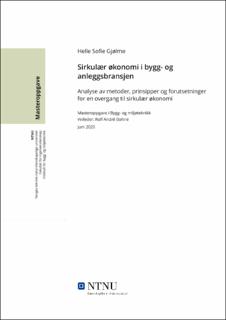| dc.contributor.advisor | Bohne, Rolf André | |
| dc.contributor.author | Gjølme, Helle Sofie | |
| dc.date.accessioned | 2021-09-20T16:14:52Z | |
| dc.date.available | 2021-09-20T16:14:52Z | |
| dc.date.issued | 2020 | |
| dc.identifier | no.ntnu:inspera:50403903:24248611 | |
| dc.identifier.uri | https://hdl.handle.net/11250/2779411 | |
| dc.description.abstract | Verden står i dag midt i en global klimakrise. Verdens ressurser begynner å bli knappe og verden har dårlig tid dersom det skal være mulig å hindre at temperaturøkningen overstiger de kritiske 1,5 gradene sammenlignet med de førindustrielle nivåene. Bygg, anlegg og eiendomsbransjen er ansvarlig for 40% av energiforbruket, 40% av klimagassutslippet, 40% av generert avfall og 40 til 50% av råvareuttaket på jorda. Dersom klimamålene skal nås må dette bidraget halveres i løpet av de neste 10 årene. For at bransjen skal være med å bidra må det store forandringer til, og en overgang til sirkulær økonomi kan være fordelaktig. De sirkulærøkonomiske prinsippene har som mål å eliminere avfall som begrep, og lukke materialssløyfene slik at ressurser holder seg i økonomien over flere sykluser.
Formålet med denne oppgaven er å undersøke om sirkulær økonomi vil være gunstig og mulig å innføre i bygg- og anleggsbransjen. For å undersøke dette er begrepet sirkulær økonomi undersøkt sammen med sirkulære forretningsmodeller og prinsipper knyttet opp mot økonomiske, sosiale og miljømessige perspektiver. Et videre spørsmål som er undersøkt er "Bygger vi på en måte som tilrettelegger for sirkulær økonomi". I den forbindelse er loververk vurdert for å underbygge om lovverket er til hindring eller om det tilrettelegger for en mer sirkulær bransje. Flere drivere og barrierer har blitt diskutert og kostnader, miljøpåvirkning og kvaliteten på materialhåndteringer er sammenliknet fra dagens praksis med de sirkulære prinsippene.
Denne masteroppgaven er baserert på et teoretisk grunnlag med bakgrunn i et omfattende litteraturstudie. Resultatene fra litteraturstudie tyder på at sirkulær økonomi er et tema som begynner å få stadig større oppmerksomhet i dagens samfunn, men begrepet er fremdeles noe umodent, med flere tolkninger og definisjoner av begrepet. En overgang til sirkulær økonomi vil utfordre bygg- og anleggsbransjen på flere punkter. Erfaringer fra webinar, seminarer, handlingsplaner og samtaler med personer i bransjen tyder på at et noe ensporet syn på bærekraft og bærekraftig utvikling, som ofte hovedsakelig knyttes til sorteringsgrad på byggeplass og energieffektive bygg i driftsfasen.
Avfall er et begrep som i en sirkulær økonomi ikke eksisterer. Derfor har denne oppgaven hovedsaklig fokusert på hvordan avfallsbehandlingen er i bransjen og hvor forbedringspotensiale knyttet opp mot sirkulære prinsipper ligger. | |
| dc.description.abstract | Today the world is amidst a global environmental crisis. The worlds resources are becoming scarce, and the remaining time to prevent the rise in temperature from exceeding
the critical 1.5 degrees compared to the pre-industrial levels is limited. The construction industry is today responsible for 40% of energy consumption, 40% of greenhouse gas emissions, 40% of waste generated and 40 to 50% of the raw material extraction on earth. In order to achieve the climate goals, this must be halved over the next 10 years. In order for the industry to contribute, there must be significant changes, and a transition to a circular economy will be beneficial. The circular economy principles aim to eliminate waste as a concept and close the material loops so that resources stay in the economy over several cycles.
The main purpose of this thesis is to investigate whether circular economy will be beneficial and possible to introduce in the construction industry. To investigate this, the concept of circular economy has been studied together with circular business models and principles linked to either an economic, social or environmental reference frame. Another question that has been investigated is "Do we utilize building methods and principles in a way that facilitates circular economy". In this context, legislation is assessed, to substantiate whether the legislation is an obstacle or whether it facilitates a more circular industry. Furthermore, several drivers and barriers have been discussed, and costs, environmental impact, and the quality of the material handling have been compared in light of the circular principles to the current practice.
This master's thesis is based on a theoretical approach founded on a comprehensive literature study. The results of the literature study suggest that circular economics is a topic that is beginning to gain more traction in today's society, but that it is somewhat immature. Because of this there are multipal interpretations and definitions of the term. A transition to a circular economy will challenge the building, construction and real estate industries on several points. Participation in webinars, seminars, studies of action plans and conversations with people in the industry indicate that the view of sustainability and sustainable development is hidebound, and is often mainly related to the degree of sorting on site and energy-efficient buildings in the operational phase.
Waste is a term that does not exist in a circular economy. Therefore, this thesis has focused largely on what the current waste treatment comprise and where the potential for improvement linked to circular principles lies. | |
| dc.language | | |
| dc.publisher | NTNU | |
| dc.title | Sirkulær økonomi i bygg- og anleggsbransjen - Analyse av metoder, prinsipper og forutsetninger for en overgang til sirkulær økonomi | |
| dc.type | Master thesis | |
